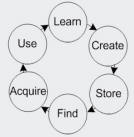The Information Realm and IT/CIO
The information realm, which is
the responsibility of IT/CIO
departments is difficult to grasp,
as information is a fluid topic
which in most cases are not even
properly measurable.
The concept of dividing the
Information realm for IT/CIO purposes
has proven itself valuable and gives
without the magnitude of possible
categorizations the possibility to
derive "hands on" conclusions what
has to be done to improve the
situation.
Dimension 1: Information Technology
This is the most probably most recognized dimension of
the commercial information realm. But also here we find
a hierarchy of subjects which are connected with the
maturity in this dimension.
The most basic component at the
lower end of the maturity level is:
"IT for operational support". Here
we find all the typical IT stuff
usually associated with IT.
Higher up one will find a distinct
the establishment of "IT for
business process support" and "IT
for innovation support" which
entails IT aspects leaving the pure
infrastructure basis and providing
specialized applications for the
respective support areas
At the highest level one will
finally find "IT for management
support" to facilitate executive
decision making. This includes
monitoring and analysis focused
applications.
Dimension 2: Information management
This is what one usually associates
loosely with knowledge management.
In fact we are talking here about
is what one is doing to convert
information into applicable
knowledge.
Elements subject to this
dimensions are the Collection of
information, its structural
Organization, processing / accessing
these information for useful
application and maintenance of the
existing information in a useful
manner. Derived from it there is one
additional area which is the
"sensing" of information which needs
to be developed in order to
efficiently find and recognize the
right and pertinent information to
be collected.
 One also can find these aspects
described from a "learning"
perspective with the following
elements
One also can find these aspects
described from a "learning"
perspective with the following
elements
|
Dimension 3: Social treatment of information
This dimension is usually not at
all associated with the realm of
information let alone with IT, but
it is the most essential one to have
a look at in order to positively
influence the maturity and
performance of a company.
In essence it is the capability
to instil and promote behaviours and
values in its people for effective
use of information.
Is information passed on
correctly or are they manipulated
for personal reasons, do members of
an organization use and trust formal
sources of information, is or is it
possible to disclose information
about business performance to all
employees, are employees openly
discussing mistakes in a positive way
as "lessons learned", is free
exchange of non-sensitive
information practiced, are
information which are challenging
the "established way" proactively
sought out as an opportunity to
improve?
Conclusion
It is essential to realize that there is a very strong
dependency between these 3 dimensions and it is fair to
say that the Whole IT success is only as strong as the
weakest dimension of it.
 It is comparable with a triangular
container with 3 sides of different
height.
It is comparable with a triangular
container with 3 sides of different
height.
If water is poured in it
won't rise higher then the height of
the lowest side.
Compared to the IT dimensions the 3
sides represent the maturity of the
3 dimensions. And the height of the
Water filled into the container
represents the overall maturity of
the IT dimensions for the Company as
a whole. Hence the maximum IT
Maturity for a company corresponds
to the lowest maturity of any of the
3 dimensions.
Compared in another way, a company
with full maturity in Information
technology and Information
management, but poor social
treatment of information has an
overall poor IT maturity.
However a company of moderate but
even maturity in all 3 dimensions
has also a moderate overall IT
maturity and outperforms a company
of the type mentioned above.
It should have been become clear
that it is essential to have a look at
the way one addresses each dimension
and the maturity a given company has,
as it can clearly point out what
needs to be done to improve the over
all maturity. Being master at one
dimension won't bring the desired
effect. It needs to be a harmonized
progression.
Assessing the "as-is"
situation, determining the "to-be"
and establishing a Roadmap to go
there is hence essential.
|